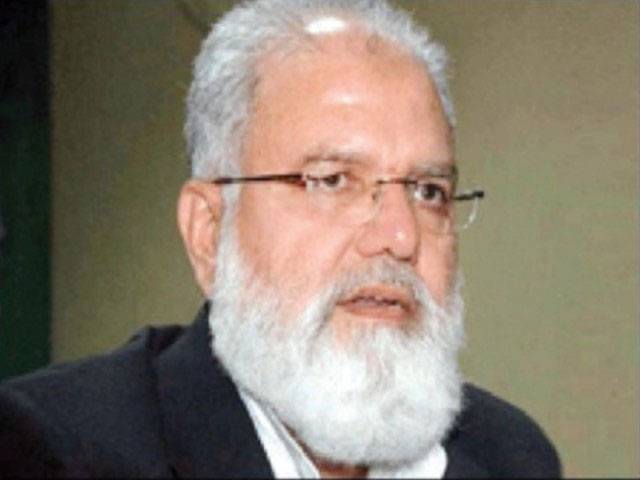KARACHI - Jamaat-e-Islami central leader Liaquat Baloch said on Tuesday that before establishing electoral alliances, opposition parties should unite for a one-point agenda of ensuring free and fair general elections.
Talking to journalists at the JI Karachi office, Idara Noor-e-Haq, the JI leader said that unity of opposition parties was necessary for transparent polls, which, according to him, was the only solution to the problems of the country. He ruled out the possibility of fair elections without evolving a consensus interim government and autonomous election commission.
To a question, Baloch said the JI was in touch with various political and religio-political parties, including the Pakistan Tehreek-e-Insaf and PML-N, for a grand alliance against the ruling party. He also said that negotiations were underway in this regard. About the law and order situation in Karachi, Baloch observed that the formula and philosophy of resolving issues on the basis of power had absolutely failed in Karachi.
He added that the city was bleeding due to the so-called reconciliation policy of President Asif Ali Zardari. He alleged that owing to the provision of synthetic oxygen to his shaking government, Zardari had given all coalition parties a free hand for terrorism. He urged democratic forces, those seeking change in society and mediamen to play their due role for the preservation of peace in Karachi and across the country.
Baloch also claimed that the game of the establishment to divide political powers had been unveiled, asserting that it had failed to ensure the national sovereignty.
Relating the Arab spring with the domestic situation of Pakistan, the JI leader said that a revolution, on the design of Egypt and Tunis, was brewing in Pakistan. He said that ideological movements usually used to take time for achievements, but did become fruitful one day.
He said that Islamic movements were being welcomed across the world, particularly in the Islamic block of Middle East. Few years ago, no one could imagine that idols of dictators would be knocked down in Egypt and Tunisia.
Meanwhile, a delegation of Arakani Muslim religious scholars and clerics called on Jamaat-e-Islami Karachi chief Muhammad Hussain Mehnati and thanked him for the support of the JI over the issue of Muslims’ massacre in Burma.
The delegation, on the behalf of Muslims of Burma, expressed their gratitude to the JI for highlighting the issue. To the delegation, Mehnati said that it was the obligation of the entire Muslim Umma to help and support their brothers. He was of the view that it was the issue of the entire Muslim Umma. Mehanti, however, alleged that the global community had proved its dual standards and revealed that international powers could do nothing for the Muslims.
On the occasion, the delegation also spoke to JI chief Syed Munawar Hassan by telephone and conveyed to him the feelings of Myanmar Muslims.
Hassan assured the delegates of complete support of his party. He termed the killing of Burmese Muslims as condemnable. He regretted that the Pakistan government, United States and United Nations didn’t take any effective measures to safeguard the Muslim community in Burma.
Thursday, November 21, 2024
Egypt, Tunis-like revolution brewing in country: Baloch

Silent pandemic of antibiotic resistance threatens Pakistan’s health sector, warn experts
9:32 PM | November 20, 2024
PM Shehbaz urges Senate to play role in promoting national unity
8:28 PM | November 20, 2024
CII Chairman clarifies VPN stance, blames typographical error
8:17 PM | November 20, 2024
Imran Khan's release uncertain despite bail in Toshakhana case: Tarar
8:02 PM | November 20, 2024
Rangers, FC deployed in Islamabad ahead of PTI protest
7:49 PM | November 20, 2024
-
Hunger crisis to increase in South Sudan, warns UN
-
Hunger crisis to increase in South Sudan, warns UN
-
Pakistan’s judiciary champions climate justice at COP29 in Baku
-
Punjab struggles with persistent smog as Met Office forecast rainfall
-
Punjab residents face escalating smog crisis as pollution levels soar across country
-
Qatar says Hamas 'no longer welcome' in Gulf state
Digital Stagnation
November 20, 2024
Xi’s Red Lines
November 20, 2024
Last Call
November 20, 2024
Sindh & Indus
November 19, 2024
Another US Escalation
November 19, 2024
Tackle Corruption Within School Boards
November 20, 2024
To Be Opportunistic
November 20, 2024
Democratic Backsliding
November 20, 2024
Empowering Tharparkar through Skills Development
November 20, 2024
Why Not Use AI to Address Climate Change?
November 19, 2024
ePaper - Nawaiwaqt
Nawaiwaqt Group | Copyright © 2024





